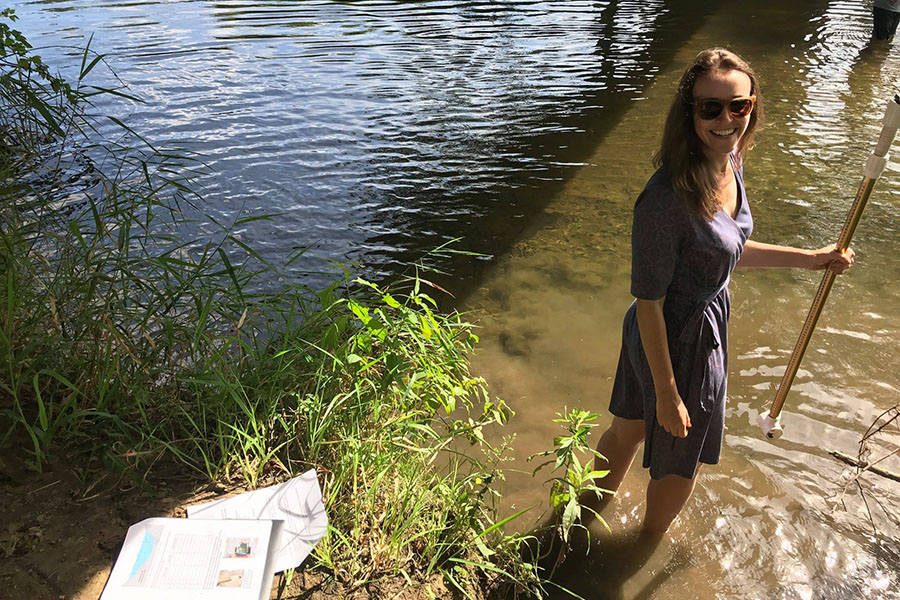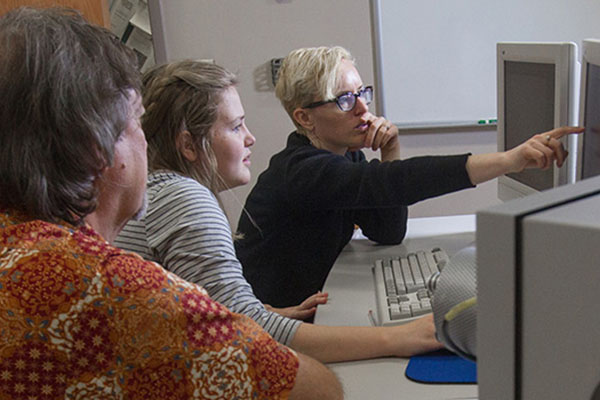BOONE, N.C. — Dr. Sarah Evans never wants her lectures to be dry — particularly since her subject is water: its movement, quality and interactions on and below the Earth’s surface.
“My job, as a professor, is to get students excited about the topic,” Evans said. “Why do we care about water? No matter what our education level is or whether or not we’re interested in science, water is something that affects everyone.”
Evans joined Appalachian State University’s Department of Geological and Environmental Sciences as an assistant professor in 2017.
In her introductory courses, Evans might have students examine the flood risk at various campus buildings, or perhaps at their own homes. She incorporates current news stories — such as the aftermath of hurricanes or the water shortage crisis in Cape Town, South Africa — in her classes to engage students in real-world applications of environmental geology.
During her lectures, Evans also offers examples from her own research — studying the relationship between climate change and groundwater flow systems.
“I am specifically interested in Arctic places, like Alaska, where we have frozen ground or permafrost. Frozen ground blocks groundwater from moving, but as the climate warms and melts permafrost, the communities downstream are affected and aquatic habitats become endangered,” Evans explained.
Locally, Evans uses the same processes used in her Arctic research to study how groundwater and temperature interact in the Appalachian Mountains. “I have a project ongoing with students, looking at wetlands and the population of bog turtles,” she said.
“The bog turtles need a habitat that is a particular temperature. Because the climate is warming, the water is becoming too warm for the turtles in the summertime,” Evans said.
Evans involves her students in this study. “They do the fieldwork — programming the measurement devices that take water temperatures in different spots in the wetlands (and) evaluating and processing the data,” she said.
Though Evans said she loves going outdoors in her free time, most of her own work is indoors, using computers to analyze data. Evans exposes students to both outdoor fieldwork and computer analytics in preparing them for the workforce in environmental geology.
She is passionate about introducing more diversity into the field of geology, describing jobs that appeal to a variety of interests. “One of the biggest barriers to studying geology is people think of it exclusively as a field science, where people go outside and pound on rocks. We’re trying to raise awareness that there are opportunities to work indoors, in office environments, as well,” she said.
The opportunity to mentor undergraduates is one of the reasons Evans chose to come to Appalachian. “I was mentored by professors as an undergraduate, and that set my trajectory through school. I want to give that back to my own students.”
“It’s great to be at a place where professors really care about the students,” Evans continued. When she interviewed for her position at Appalachian, Evans was impressed that the professors in her department talked about various students by name. “I could tell they really knew their students. That was special and unique to Appalachian.”
What do you think?
Share your feedback on this story.
About the Department of Geological and Environmental Sciences
Located in Western North Carolina, Appalachian State University provides the perfect setting to study geological and environmental sciences. The Department of Geological and Environmental Sciences provides students with a solid foundation on which to prepare for graduate school or build successful careers as scientists, consultants and secondary education teachers. The department offers six degree options in geology and two degree options in environmental science. Learn more at https://earth.appstate.edu.
About the College of Arts and Sciences
The College of Arts and Sciences (CAS) at Appalachian State University is home to 17 academic departments, two centers and one residential college. These units span the humanities and the social, mathematical and natural sciences. CAS aims to develop a distinctive identity built upon our university's strengths, traditions and locations. The college’s values lie not only in service to the university and local community, but through inspiring, training, educating and sustaining the development of its students as global citizens. More than 6,800 student majors are enrolled in the college. As the college is also largely responsible for implementing App State’s general education curriculum, it is heavily involved in the education of all students at the university, including those pursuing majors in other colleges. Learn more at https://cas.appstate.edu.
About Appalachian State University
As a premier public institution, Appalachian State University prepares students to lead purposeful lives. App State is one of 17 campuses in the University of North Carolina System, with a national reputation for innovative teaching and opening access to a high-quality, cost-effective education. The university enrolls more than 21,000 students, has a low student-to-faculty ratio and offers more than 150 undergraduate and 80 graduate majors at its Boone and Hickory campuses and through App State Online. Learn more at https://www.appstate.edu.





![How NCInnovation Is Rethinking Economic Development in North Carolina [faculty featured]](/_images/_posts/2026/02/rethinking-economic-development-600x400.jpg)







